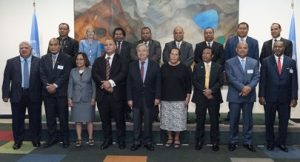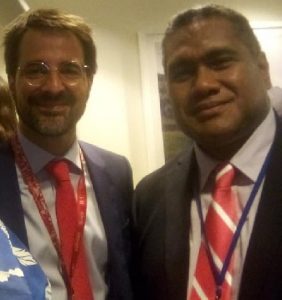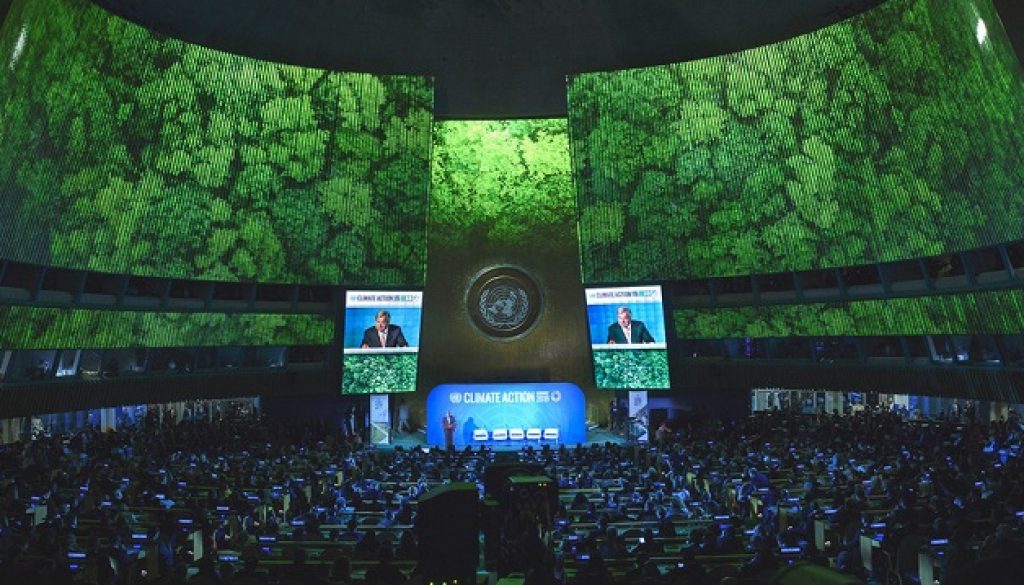Climate change commitments continue
24th September 2019 The Government of Tonga will continue to work on commitments to the Paris Agreement as the Pacific island countries push for more action on climate change.
The Chief Executive Officer for Climate Change and Environment (MEIDECC), Mr Paula Ma’u made the comments in New York today as the United Nations Secretary-General’s Climate Action Summit got underway.
“We will recommit ourselves to what we have already committed to in the Paris Agreement,” Mr Ma’u said.
“The work continues for Tonga and we are committed and carrying out our national programs to achieve the targets and commitments we had made.
“This is important as we must all, as countries and nations of the Pacific and the world, continue to play our part in achieving our national targets, which will contribute to achieving our regional and international commitments.”
The Tongan delegation, which also includes Mr Edgar Cocker Chief Secretary & Secretary to Cabinet, Mr Mahe Tupouniua CEO for Foreign Affairs, Ms Balwyn Faotusia CEO for Finance, HE Vainga Tone Ambassador of Tonga to the UN and USA, Mr Suka Mangisi, Deputy Ambassador, Mr Ilaisipa Alipate Principal Assistant Secretary for Foreign Affairs, and Mr Ma’u Alipate Principal Assistant Secretary Prime Minister’s Office, today heard the announcement of new pathways and initiatives taken by world leaders, business, and civil society.

As carbon pollution, temperatures, and climate destruction continue to rise, and public backlash mounts, the Summit has offered a turning point from inertia into momentum, action, and global impact – if everyone gets on board.
The UN estimates that the world would need to increase its efforts between three- and five-fold to contain climate change to the levels dictated by science – a 1.5°Crise at most – and avoid escalating climate damage already taking place around the world.
However, the Paris Agreement provides an open-door framework for countries to continuously ratchet up their positive actions, and today’s Summit demonstrates how governments, businesses, and civilians around the world are rising to the challenge.
“The best science, according to the Intergovernmental Panel on Climate Change, tells us that any temperature rise above 1.5 degrees will lead to major and irreversible damage to the ecosystems that support us,” United Nations Secretary-General António Guterres said today.
“Science tells us that on our current path, we face at least 3-degrees Celsius of global heating by the end of the century.
“The climate emergency is a race we are losing, but it is a race we can win.
“This is not a climate talk summit. We have had enough talk,” he added. “This is not a climate negotiation summit. You don’t negotiate with nature. This is a climate action summit.”

Secretary General Guterres said everyone is making commitments to the Paris Agreement.
“Governments are here to show you are serious about enhancing Nationally Determined Contributions under the Paris Agreement. Cities and businesses are here showing what leadership looks like, investing in a green future. Financial actors are here to scale-up action and deploy resources in fundamentally new and meaningful ways. Coalitions are here with partnerships and initiatives to move us closer to a resilient, carbon-neutral world by 2050,” he said.
“And young people are here providing solutions, insisting on accountability, demanding urgent action.”
Increased Ambition, Accelerated Action
The Summit, designed to showcase government, business, and civil society efforts to increase their commitments under the Paris Agreement and work toward reducing emissions to essentially zero by mid-century.
Many countries used the Summit to demonstrate next steps on how by 2020 they will update their Nationally Determined Contributions (NDCs) with the aim to collectively reduce emissions by at least 45 percent by 2030 and prepare national strategies to achieve carbon neutrality by mid-century.
- The UN Global Compact demonstrated that business is moving, as companies with a combined market capitalization of more than US$2.3 trillion and annual direct emissions equivalent to 73 coal-fired power plants pledged to take action to align their businesses with science-based targets.
- Many of the more than 70 key announcements showcase the concrete ways in which countries can better adapt to climate change and cut emissions while getting the necessary technical and financial support many of them need.
- Getting out of coal is a priority. The Powering Past Coal Alliance expanded to include 30 countries, 22 states or regions, and 31 corporations committed to stopping the building of new coal power plants in 2020 and rapidly transitioning to renewable energy.
- The Summit participants recognize that to limit climate change to 1.5°C, action needs to start now.
- The Secretary-General has stated that he, and the entire UN System, will remain engaged in the follow-up of the commitments made today and will work to further scale up and monitor the initiatives to achieve the promised goals and objectives.
Climate Finance
- The Asset Owner Alliance, a group of the world’s largest pension funds and insurers, responsible for directing more than US$2 trillion in investments, committed to transitioning to carbon-neutral investment portfolios by 2050. The members of the Alliance will immediately start to engage with companies in which they are investing to ensure they decarbonize their business models.
- The International Development Finance Club (IDFC) – a leading group of 24 national and regional development banks from all over the world, with a majority active in emerging and developing countries – announced for the first time a quantitative target of mobilizing US$1 trillion by 2025, with at least $100 million for adaptation. In addition, IDFC will launch a partnership with the Green Climate Fund to promote direct access to international climate finance and a new US$10 million Climate Facility to increase capacity to support its members on climate finance.
Unlocking the Potential of Nature in Climate Action
- Several countries launched the Global Campaign for Nature, which aims to conserve 30 percent of the Earth’s lands and oceans by 2030.
- A new initiative by Central American countries aims, by 2030, to establish and manage 10 million hectares of “sustainable productive landscapes that are resilient to climate change,” with a goal of no less than 40 percent reduction in emissions from the baseline year of 2010.
- Launch of a High-Level Panel for the Sustainable Ocean Economy, representing 14 countries that cover approximately 30 percent of the world’s coastlines, 30 percent of the world’s exclusive economic zones, 20 percent of the world’s ocean catch, and 20 percent of the world’s shipping fleet, including a new initiative to build resilience for the ocean and marine-protected areas.
- The Central African Forest Initiative (CAFI) will increase the climate ambition and maintain the forest cover of Gabon, Cameroon, Central African Republic, Republic of Congo, the Democratic Republic of Congo, and Equatorial Guinea, allowing the Central African rainforest to continue to provide livelihoods of 60 million people and maintain regional rainfall patterns.
- The One Planet Business for Biodiversity, led by the World Business Council for Sustainable Development, will protect and nurture biodiversity through commitments structured around scaling up regenerative agriculture practices, providing a more diversified product portfolio to consumers, and supporting the protection and restoration of high-value ecosystems – including forests.
Assistance for the Least Developed Countries (LDCs)
- The Climate Investment Platform will seek to directly mobilize US$1 trillion in clean energy investment by 2025 in 20 least developed countries. The platform will provide a menu of services to governments and private sector clients in their efforts to scale-up energy transition and accelerate investments for low carbon, climate-resilient development. It will also enable the delivery of ambitious NDCs.
- The LIFE-AR initiative, led by least developed countries, will strengthen South-South cooperation, aim to mobilize US$30-40 million, and deliver pathways to climate-resilient development by 2030 and net zero emissions by 2050.
Small Island Developing States
- Small Island Developing States made a collective commitment to raise the ambition of their NDCs by 2020 and move to net zero emissions by 2050, contingent on assistance from the international community. They intend to move to 100 percent renewable energy by 2030 and provide support for initiatives that aim to address immediate adaptation needs and the transition to climate resilience.
Cutting GHG Emissions Now with Cooling and Energy Efficiency
- The “Three Percent Club” – a coalition of countries, businesses, and institutions – commit to putting in place more ambitious energy efficiency policies and working to drive a 3 percent annual global increase in energy efficiency, a target necessary to meet global climate goals while enhancing economic prosperity in all countries.
- The Cool Coalition will address cooling as a “major blind spot” by delivering up to 1 degree on the pathway to a 2050 net zero carbon world. With emissions from air conditioning and refrigeration expected to rise 90 percent from 2017 levels by 2050, the collective platform will set ambitious cooling targets and support cross-sectional national strategies and policies such as National Cooling Action Plans.
People Centered Action Now
- The International Labor Organization (ILO) and other members of the Summit’s Social and Political Drivers Action Area, co-led by Spain and Peru, launched the “Climate Action for Jobs” initiative, with the goal of developing a framework for countries that considers job creation, social protection, skills development, and technology and knowledge transfer when taking climate action.
- The Safe Air Initiative will call on governments—both national and at the regional or state level—to commit to achieving air quality that is safe for populations and to align their climate change and air pollution policies by 2030, backed up by commitments from financial institutions and funds.
- Thirty-two national governments committed to implementing gender-responsive climate change action plans, policies, and strategies and empowering women as leaders of climate action.
The Economy Moving from Grey to Green
- A coalition of public and private entities working on the heavy industry transition towards net zero emissions by mid-century set out pathways for carbon intensive sectors to reach net zero emissions by 2050.
- The shipping industry launched the Getting to Zero Coalition, bringing together decision makers from across the shipping value chain to reduce GHG emissions by at least 50 percent by 2050 and make the transition to full decarbonization possible. The coalition will develop and deliver a roadmap with tangible steps to accelerate the deployment of zero emissions vehicles.
ENDS
Issued by the: Ministry of Meteorology, Energy, Information, Disaster Management, Environment, Climate Change & Communications.

